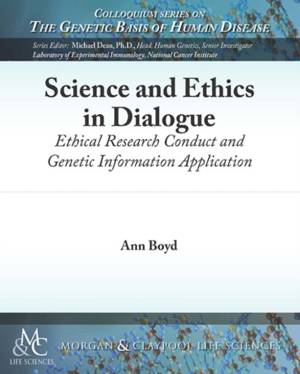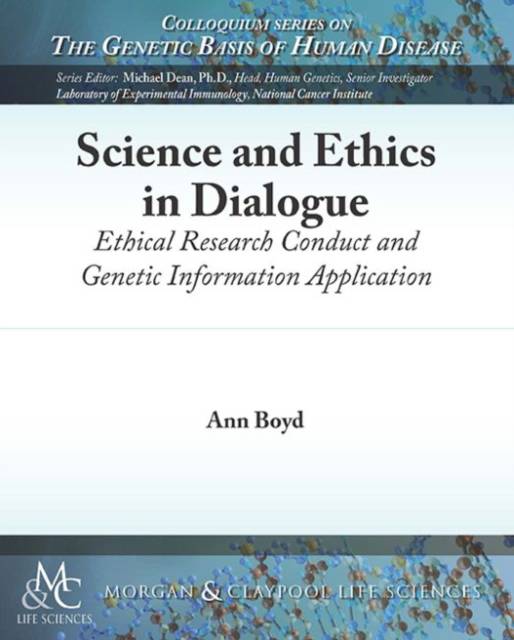
- Retrait gratuit dans votre magasin Club
- 7.000.000 titres dans notre catalogue
- Payer en toute sécurité
- Toujours un magasin près de chez vous
- Retrait gratuit dans votre magasin Club
- 7.000.000 titres dans notre catalogue
- Payer en toute sécurité
- Toujours un magasin près de chez vous
Science and Ethics in Dialogue
Ethical Research Conduct and Genetic Information Application
Ann Boyd
76,45 €
+ 152 points
Description
This book represents my experience teaching graduate students in Biomedical Science at Hood College. Being science majors, the students have a limited background in philosophy and ethics. Most of the graduate students are employed at area research laboratories while also pursuing a Master of Science degree. Their practical day-to-day experience in scientific research is helpful in discussions of responsible conduct of research cases. Being aware of increased cases of misconduct the United States established the Office of Research Integrity (ORI). Their publication, Introduction to the Responsible Conduct of Research, defines misconduct as fabrication, falsification, and plagiarism. Concern for the breach of public trust with repercussions in scientific funding has led to mandates for courses in ethics for students pursuing a scientific career. In addition, the Human Genome Project megaproject funded Ethical, Legal, and Social Implications Research (www.genome.gov/ELSI/) recognizing that the genetic information produced by the project would come with applied ethical dilemmas. Teaching can be understood as conveying knowledge from generation to generation. Likewise systems of morality are collective acquisitions built up over millennia with social norms and values that aim to maintain social order. Research does not support the premise that knowing the rules of conduct will prevent misconduct. Indeed, compliance with rules can give a false sense of security, especially if the ethical reasoning grounding the rules is not understood. Therefore, I try to sketch a path through the potential phases and avenues of a scientific career, imagining that a person may do basic research, serve on ethics committees, and engage the public in ethical use of new advances in genetics. As a result the content of this text is divided into three parts. The first part deals with foundational material on science and ethics and cases that highlight proper scientific professional conduct. The second part deals with clinical research through which a research discovery is moved to the bedside of patients and the ethical parameters of the transition. The third part sketches the ethical dilemmas evolving from progress in genetic information to clinical applications. Helping students find a moral compass, a grounding of why one ought to behave in ethical ways in their profession and more generally in life is challenging. Doing so increases their awareness and mine of potential dilemmas and how to deal with them ethically.
Spécifications
Parties prenantes
- Auteur(s) :
- Editeur:
Contenu
- Nombre de pages :
- 163
- Langue:
- Anglais
- Collection :
Caractéristiques
- EAN:
- 9781615047161
- Date de parution :
- 01-10-15
- Format:
- Livre broché
- Format numérique:
- Trade paperback (VS)
- Dimensions :
- 190 mm x 235 mm
- Poids :
- 294 g







